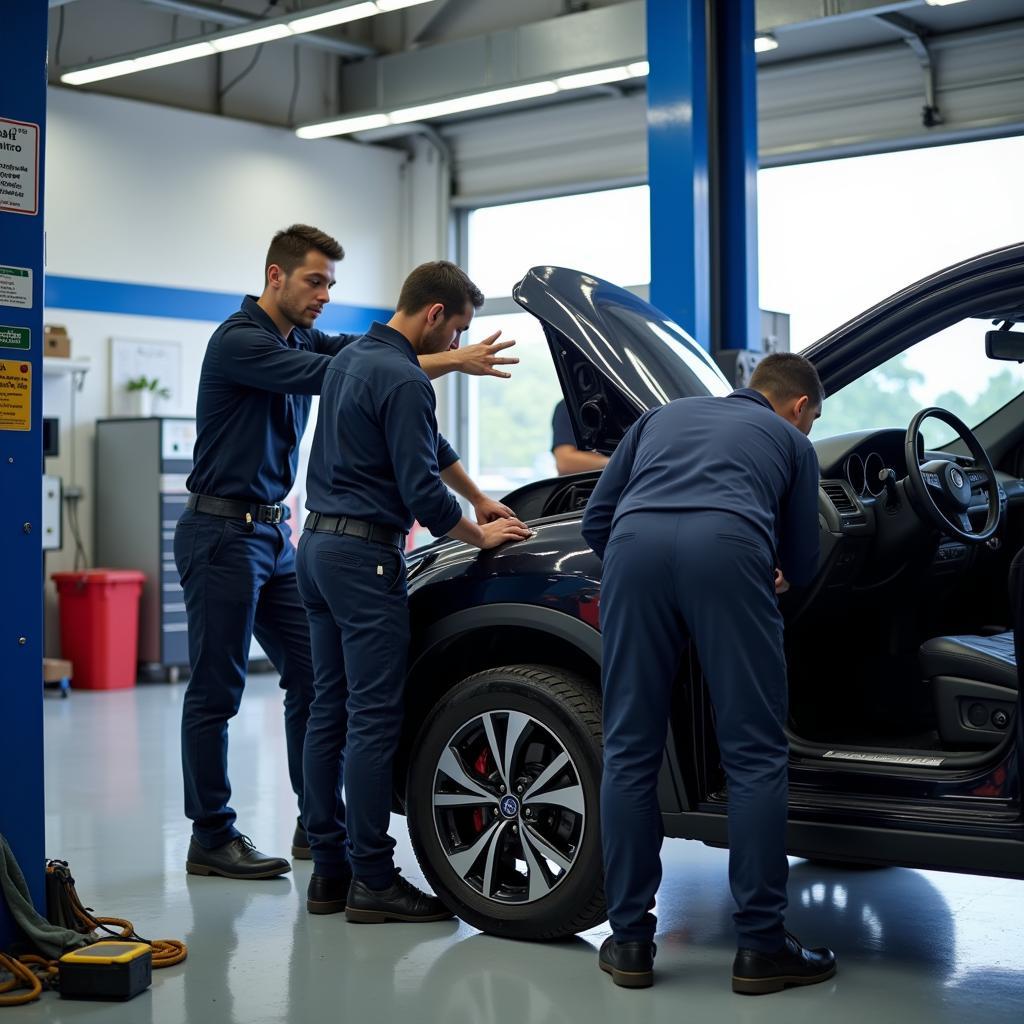What Happens When You Have Your Car Serviced?
Getting your car serviced is crucial for its longevity and performance. But What Happens When You Have Your Car Serviced? This article will delve into the details of a typical car service, explaining the checks, replacements, and overall benefits. We’ll cover everything from routine maintenance to more in-depth repairs, ensuring you understand the process and its importance.
Understanding Car Servicing: More Than Just an Oil Change
Many people associate car servicing with a simple oil change. While an oil change is a critical component, a comprehensive car service involves much more. It’s a preventative measure designed to identify potential problems before they escalate, ensuring your safety and saving you money on costly repairs down the line. It also maintains the vehicle’s value, a significant factor if you plan on trading it in. should i service my car before trading it in.
What’s Included in a Standard Car Service?
A standard car service typically includes a series of checks and replacements, categorized into essential and recommended services. Essential services address crucial components for safe and efficient operation. Recommended services, while not immediately necessary, contribute to the vehicle’s long-term health and performance.
- Oil and Filter Change: This is the cornerstone of any car service. Old oil loses its lubricating properties, leading to increased engine wear and tear.
- Fluid Top-Ups: Brake fluid, coolant, power steering fluid, and windshield washer fluid are all checked and topped off as needed. These fluids are vital for the proper functioning of various systems.
- Brake Inspection: Brakes are checked for wear and tear, ensuring optimal stopping power. This includes inspecting brake pads, rotors, and lines.
- Tire Check: Tire pressure and tread depth are examined. Proper tire pressure contributes to fuel efficiency and safe handling.
- Light Check: All lights, including headlights, taillights, brake lights, and indicators, are inspected to ensure they are working correctly.
Beyond the Basics: More Comprehensive Services
Depending on your car’s age, mileage, and manufacturer recommendations, additional checks and services may be included or recommended. These can include:
- Spark Plug Replacement: Spark plugs ignite the air-fuel mixture in the engine. Worn-out spark plugs can reduce fuel efficiency and engine performance.
- Air Filter Replacement: A clean air filter ensures the engine receives clean air for optimal combustion.
- Cabin Air Filter Replacement: This filter cleans the air entering the cabin, improving air quality inside the vehicle.
- Battery Check: The battery’s health is assessed, ensuring it can reliably start the engine.
- Suspension Check: The suspension system is inspected for wear and tear, ensuring a smooth and comfortable ride.
What Happens During a Car Service Appointment?
When you take your car for servicing, a qualified technician will follow a specific process:
- Initial Inspection: The technician will discuss any concerns you may have and review your car’s service history.
- The Service: The technician will perform the agreed-upon services, following manufacturer guidelines and best practices. what do they do when servicing a car.
- Final Inspection: After completing the service, the technician will conduct a final inspection to ensure everything is functioning correctly.
- Report and Recommendations: The technician will provide you with a report outlining the work completed and any recommendations for future service. how much time does it usually take for car servicing.
“Regular servicing isn’t just about keeping your car running smoothly; it’s about ensuring your safety and protecting your investment,” says automotive expert, Michael Stevenson, Chief Mechanic at Stevenson Automotive Solutions.
Why Regular Car Servicing is Essential
Regular car servicing is vital for a multitude of reasons:
- Safety: Maintaining critical components like brakes and tires ensures your safety on the road.
- Reliability: Regular maintenance reduces the risk of breakdowns and unexpected repairs. is it bad to not service your car.
- Performance: A well-maintained car performs more efficiently, offering better fuel economy and a smoother ride.
- Resale Value: A comprehensive service history increases the resale value of your vehicle. where do i go to get my kia car serviced.
“Think of car servicing as a health check-up for your vehicle,” advises Sarah Johnson, Lead Technician at Johnson Auto Repair. “Just like regular doctor visits, regular servicing can catch small problems before they become major issues.”
Conclusion
Understanding what happens when you have your car serviced empowers you to make informed decisions about your vehicle’s maintenance. Regular servicing is not just an expense; it’s an investment in your car’s longevity, performance, and your safety.
FAQ
- How often should I service my car?
- What is the difference between an interim service and a full service?
- Can I service my car myself?
- How much does a car service typically cost?
- What should I look for in a reputable car service center?
- What happens if I don’t service my car regularly?
- What are some common warning signs that my car needs servicing?
Need help with your car service? Contact us via WhatsApp: +1(641)206-8880, Email: [email protected] or visit us at 456 Oak Avenue, Miami, FL 33101, USA. We have a 24/7 customer service team.

